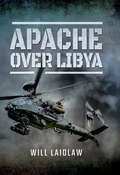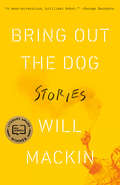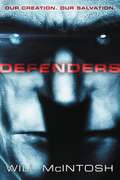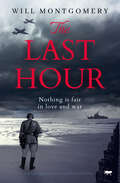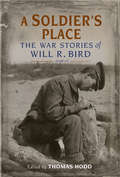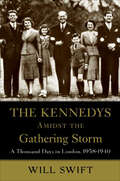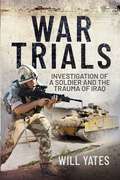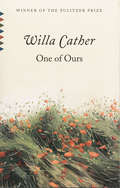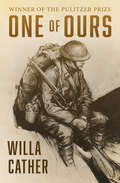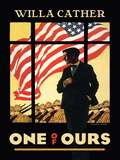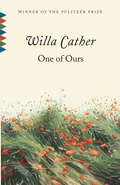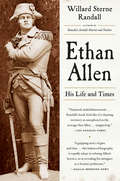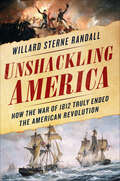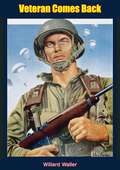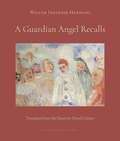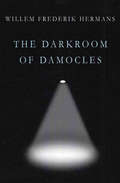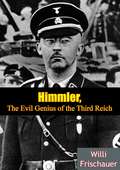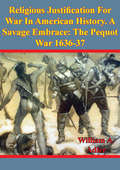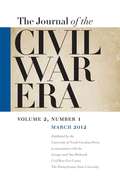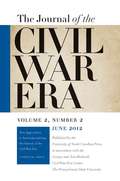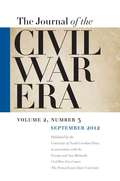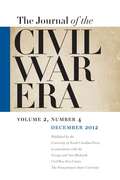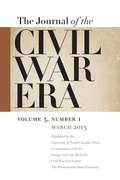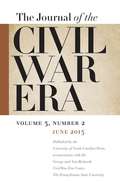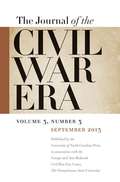- Table View
- List View
Apache Over Libya
by Will LaidlawIn this military memoir, an Army Air Corps pilot recounts his experience flying Apache helicopters behind enemy lines in the First Libyan Civil War. In May 2011, after a routine exercise in the Mediterranean, HMS Ocean and her fleet of Apache attack helicopters were about to head home. But the civil war in Libya and the resulting NATO air campaign intervened. Soon the author and his fellow Apache pilots were flying at night over hostile territory. Despite Libya's cutting-edge defense systems and land-to-air weapons, the Apaches made nightly raids at ultra low-level behind enemy lines. They had to fight their way into Libya and complete their mission before the hazardous return to Ocean.Apache Over Libya describes the experiences of eight Army and two Royal Navy pilots who played a significant role in the NATO-led campaign. Despite fighting the best armed enemy British aircrew have faced in generations, they defied the odds and survived. Thrilling firsthand action accounts vividly convey what it means to fly the Apache in combat at sea and over enemy-held terrain. This unforgettable account gives a rare insight into attack helicopter operations in war.
Bring Out the Dog: Stories
by Will Mackin“A near-miraculous, brilliant debut.”—George Saunders, Man Booker Prize–winning author of Lincoln in the Bardo “In one exquisitely crafted story after the next, Will Mackin maps the surreal psychological terrain of soldiers in a perpetual war.”—Phil Klay, National Book Award–winning author of Redeployment The eleven stories in Will Mackin’s mesmerizing debut collection draw from his many deployments with a special operations task force in Iraq and Afghanistan. They began as notes he jotted on the inside of his forearm in grease pencil and, later, as bullet points on the torn-off flap of an MRE kit. Whenever possible he incorporated those notes into his journals. Years later, he used those journals to write this book. Together, the stories in Bring Out the Dog offer a remarkable portrait of the absurdity and poetry that define life in the most elite, clandestine circles of modern warfare. It is a world of intense bonds, ancient credos, and surprising compassion—of success, failure, and their elusive definitions. Moving between settings at home and abroad, in vivid language that reflects the wonder and discontent of war, Mackin draws the reader into a series of surreal, unsettling, and deeply human episodes: In “Crossing the River No Name,” a close call suggests that miracles do exist, even if they are in brutally short supply; in “Great Circle Route Westward Through Perpetual Night,” the death of the team’s beloved dog plunges them into a different kind of grief; in “Kattekoppen,” a man struggles to reconcile his commitments as a father and his commitments as a soldier; and in “Baker’s Strong Point,” a man whose job it is to pull things together struggles with a loss of control. Told without a trace of false bravado and with a keen, Barry Hannah–like sense of the absurd, Bring Out the Dog manages to capture the tragedy and heroism, the degradation and exultation, in the smallest details of war. Advance praise for Bring Out the Dog“Good stories that deal with war must deal with the extremes of war: heroic altruism and murderous selfishness, piercing beauty and disgusting ugliness. Mackin hits all the notes and all the notes sound true. These stories are right at the top with the best I’ve ever read.”—Karl Marlantes, New York Times bestselling author of Matterhorn: A Novel of the Vietnam War
Defenders
by Will McintoshA new epic of alien invasion and human resistance by Hugo Award-winning author Will McIntosh. Our Darkest Hour.Our Only Hope.The invaders came to claim earth as their own, overwhelming us with superior weapons and the ability to read our minds like open books. Our only chance for survival was to engineer a new race of perfect soldiers to combat them. Seventeen feet tall, knowing and loving nothing but war, their minds closed to the aliens. But these saviors could never be our servants. And what is done cannot be undone.
The Last Hour: A gripping and emotional WW2 thriller
by Will MontgomeryA Royal Navy commander is tasked with stopping a German convoy, in this thrilling novel of love, courage, and honor in the midst of World War II. Harry Scott has served honorably in the Royal Navy since 1939—including at Dunkirk, where he evacuated hundreds of soldiers before his own boat was blown up and he lost many of his crew. By 1942, the tide of the war is flowing against the Allies. A worried Churchill needs to block a fleet of German reinforcements and knows his large ships would never survive. But a force of smaller vessels might just have a chance—if their voyage is kept from the enemy until it&’s too late and the group is led by the right man . . . Now Harry, with the help of officer Annie Lenton, has been tasked to bring this new flotilla together and train the officers and crew. The two gradually develop a respect and a love for each other, a love that could make or destroy them both, as a vicious sea battle looms . . .
A Soldier's Place: The War Stories of Will R. Bird
by Will R. BirdA collection of World War I short fiction by the author of the memoir And We Go On. Nova Scotia–born Will R. Bird miraculously survived the First World War and returned to Nova Scotia. Determined to tell the stories of the brave soldiers who served, Bird became one of the most prolific authors on the subject, completing works of both fiction and nonfiction. For nearly two decades following the war, Bird published war stories in magazines and periodicals, which have now gone out of print and were never digitized, and the stories had long fallen into obscurity—until now. Carefully curated by author and editor Thomas Hodd, A Soldier&’s Place is a selection of fifteen of Bird&’s best combat stories, based on the experiences of himself and of others, covering all aspects of the war effort and following brave Canadian, American, and Australian soldiers.
The Kennedys Amidst the Gathering Storm: A Thousand Days in London, 1938–1940
by Will SwiftAmbassador Kennedy’s tenure during the approach of WWII is explored in “an admirably balanced assessment of an enormously complicated man” (Kirkus, starred review).In The Kennedys Amidst the Gathering Storm, historian and psychologist Dr. Will Swift presents a fresh, empathetic interpretation of Joseph Kennedy’s ambassadorship. With extensive research and penetrating psychological insight, he explores the intricate, often shifting relationships among Kennedy, Chamberlain, Churchill, and, of course, Roosevelt.Arriving in London in early 1938, the Irish-Catholic Kennedys were welcomed by politicians, aristocrats, and intellectuals, all eager to court America. They finally appeared to have overcome their lifelong status as outsiders. From 1938 to 1940, the Kennedys crystallized their identity as protagonists on the world stage, undergoing a near-mythic rise to power. The older children—Joe Jr., Jack, and Kathleen—took part in England’s glittering society, their every move chronicled by the British and American media. As Joe, Sr.’s, political fortunes dimmed, Jack published a best-selling book that launched him toward stardom and, ultimately, the White House.Drawing on recently released Kennedy family archives, Joseph P. Kennedy’s private papers, and using rare photographs of English society and the photogenic Kennedy clan, Dr. Swift brings to life this fascinating family during a dramatic thousand-day period.
War Trials: Investigation of a Soldier and the Trauma of Iraq
by Will YatesWar Trials tells the gripping and in-depth true story of a British soldier’s role in the drowning of an Iraqi teenager in May 2003, the devastating investigation and resulting court martial. This narrative non-fiction tracks the soldier’s life from tight-knit broken family home in Merseyside through deadly urban conflict in the Middle East, to a different battle fought against PTSD while he awaited a military tribunal back in the UK. The military court case in 2006 marked the first of its kind relating to the Iraq war and a case that opened the flood gates of multiple investigations and inquiries into the conduct of soldiers overseas. Based upon rigorous new research, this book’s untold personal story explores the horrors of battle and the chaos of a post-war city and a young soldier’s struggle against depression, suicide attempts and deep sense of being let down by the army he sought to serve. This soldier would eventually endure numerous investigations and face the threat of the International Criminal Court for war crimes but these are the shocking events that started it all. It is the compelling story of a contentious military campaign with little preparation for the disastrous fall out; the soldiers pushed to the limit who maintained a wall of a silence after doing the unthinkable; and a floating body of dead child who came to symbolize a generation lost to war.
One of Ours
by Willa CatherThe son of a prosperous farmer, Claude Wheeler's future is laid out for him as clear and monotonous as the Nebraska sky--a few semesters at the local Christian college followed by marriage and a lifetime spent worrying about the price of wheat. Many young men would be happy to find themselves in Claude's shoes, but his focus is on the horizon, and on the nagging sense that out there, past the farthest reaches of the Great Plains and beyond the boundaries of convention, his true destiny awaits. When the United States finally enters the war raging in Europe, Claude makes the first, and greatest, decision of his life: He answers the call.<P><P> Pulitzer Prize Winner
One of Ours
by Willa CatherWilla Cather&’s Pulitzer Prize–winning novel of World War IThe son of a prosperous farmer, Claude Wheeler&’s future is laid out for him as clear and monotonous as the Nebraska sky—a few semesters at the local Christian college followed by marriage and a lifetime spent worrying about the price of wheat. Many young men would be happy to find themselves in Claude&’s shoes, but his focus is on the horizon, and on the nagging sense that out there, past the farthest reaches of the Great Plains and beyond the boundaries of convention, his true destiny awaits. When the United States finally enters the war raging in Europe, Claude makes the first, and greatest, decision of his life: He answers the call. Based on the experiences of Willa Cather&’s cousin—G. P. Cather received the Distinguished Service Cross and the Silver Star for bravery in World War I—and interviews she conducted with wounded veterans, One of Ours is the indelible portrait of a man—and a nation—on the cusp of profound and irreversible change. This ebook has been professionally proofread to ensure accuracy and readability on all devices.
One of Ours (The Collected Works Of Willa Cather)
by Willa CatherIn Willa Cather's Pulitzer Prize–winning novel, we meet Claude Wheeler, a young Nebraskan yearning to escape the life that has been preordained for him. Claude is dissatisfied with farming, alienated from his parents, distant from his wife, and searching for something to believe in. When the country enters the First World War, he finally discovers what he's been looking for. Away from home for the first time, Claude finds the course of his life irrevocably altered by newfound friendships and experiences on distant battlefields.One of Ours continues to be a celebratory tribute — and a grief-stricken remembrance — of World War I. It is at once a courageous and poignant story of American ideals, an extraordinary character sketch, and a disquieting look at the making of an American soldier.
One of Ours, with some Selected Letters
by Willa CatherWilla Cather's Pulitzer Prize-winning narrative of the making of a young American soldier<P><P> Claude Wheeler, the sensitive, aspiring protagonist of this beautifully modulated novel, resembles the youngest son of a peculiarly American fairy tale. His fortune is ready-made for him, but he refuses to settle for it. Alienated from his crass father and pious mother, all but rejected by a wife who reserves her ardor for missionary work, and dissatisfied with farming, Claude is an idealist without an ideal to cling to. It is only when his country enters the First World War that Claude finds what he has been searching for all his life.<P> In One of Ours Willa Cather explores the destiny of a grandchild of the pioneers, a young Nebraskan whose yearnings impel him toward a frontier bloodier and more distant than the one that vanished before his birth. In doing so, she creates a canny and extraordinarily vital portrait of an American psyche at once skeptical and romantic, restless and heroic.<P> BONUS: The edition includes an excerpt from The Selected Letters of Willa Cather.
Ethan Allen: His Life and Times
by Willard Sterne RandallThe long-awaited biography of the frontier Founding Father whose heroic actions and neglected writings inspired an entire generation from Paine to Madison. On May 10, 1775, in the storm-tossed hours after midnight, Ethan Allen, the Revolutionary firebrand, was poised for attack. With only two boatloads of his scraggly band of Vermont volunteers having made it across the wind-whipped waters of Lake Champlain, he was waiting for the rest of his Green Mountain boys to arrive. But with the protective darkness quickly fading, Allen determined that he hold off no longer. While Ethan Allen, a canonical hero of the American Revolution, has always been defined by his daring, predawn attack on the British-controlled Fort Ticonderoga, Willard Sterne Randall, the author of Benedict Arnold, now challenges our conventional understanding of this largely unexamined Founding Father. Widening the scope of his inquiry beyond the Revolutionary War, Randall traces Allen's beginning back to his modest origins in Connecticut, where he was born in 1738. Largely self-educated, emerging from a relatively impoverished background, Allen demonstrated his deeply rebellious nature early on through his attraction to Deism, his dramatic defense of smallpox vaccinations, and his early support of separation of church and state. Chronicling Allen's upward struggle from precocious, if not unruly, adolescent to commander of the largest American paramilitary force on the eve of the Revolution, Randall unlocks a trove of new source material, particularly evident in his gripping portrait of Allen as a British prisoner-of-war. While the biography reacquaints readers with the familiar details of Allen's life--his capture during the aborted American invasion of Canada, his philosophical works that influenced Thomas Paine, his seminal role in gaining Vermont statehood, his stirring funeral in 1789--Randall documents that so much of what we know of Allen is mere myth, historical folklore that people have handed down, as if Allen were Paul Bunyan. As Randall reveals, Ethan Allen, a so-called Robin Hood in the eyes of his dispossessed Green Mountain settlers, aggrandized, and unabashedly so, the holdings of his own family, a fact that is glossed over in previous accounts, embellishing his own best-selling prisoner-of-war narrative as well. He emerges not only as a public-spirited leader but as a self-interested individual, often no less rapacious than his archenemies, the New York land barons of the Hudson and Mohawk Valleys. As John E. Ferling comments, "Randall has stripped away the myths to provide as accurate an account of Allen's life as will ever be written." The keen insights that he produces shed new light, not only on this most enigmatic of Founding Fathers, but on today's descendants of the Green Mountain Boys, whose own political disenfranchisement resonates now more than ever.
Unshackling America: How the War of 1812 Truly Ended the American Revolution
by Willard Sterne RandallUnshackling America challenges the persistent fallacy that Americans fought two separate wars of independence. Williard Sterne Randall documents an unremitting fifty-year-long struggle for economic independence from Britain overlapping two armed conflicts linked by an unacknowledged global struggle. Throughout this perilous period, the struggle was all about free trade.Neither Jefferson nor any other Founding Father could divine that the Revolutionary Period of 1763 to 1783 had concluded only one part, the first phase of their ordeal. The Treaty of Paris of 1783 at the end of the Revolutionary War halted overt combat but had achieved only partial political autonomy from Britain. By not guaranteeing American economic independence and agency, Britain continued to deny American sovereignty.Randall details the fifty years and persistent attempts by the British to control American trade waters, but he also shows how, despite the outrageous restrictions, the United States asserted the doctrine of neutral rights and developed the world’s second largest merchant fleet as it absorbed the French Caribbean trade. American ships carrying trade increased five-fold between 1790 and 1800, its tonnage nearly doubling again between 1800 and 1812, ultimately making the United States the world’s largest independent maritime power.
Veteran Comes Back
by Willard WallerIs he the man you knew—or a stranger? Is he bitter? hopeful? disillusioned? What sort of husband, father, son, will he make? Will you let demagogues exploit and subvert him as they have done elsewhere? How can we help him find the road back?Will he sell apples and pawn his medals, or will we assure him a job? What of the disabled—how can we restore him to usefulness? Will we make the grim mistake of spending too much—too late—and for the wrong people? These and other questions are answered in this book—a realistic discussion of America’s gravest social problem.…The Veteran’s Future is in your hands—and Your Future is in his hands!THIS book is written not only to help the veteran adjust to society, but also to help the veteran’s father, mother, wife, sister, sweetheart, to understand his state of mind. For it is only through a sympathetic understanding of what he has really become through war, that it is possible to help him at all. This book deals with such concrete problems as: the veteran’s marital relations—dealing with the crippled veteran at home—war brides and G.I. babies—veterans organizations—re-educating veterans—the lures of demagogues to capture the veteran’s vote—his struggle to get a satisfactory job—the delicate question of treating psychoneurotic veterans—and many others.…This book does not presume to give all the answers. The author hopes that it will be a firebell in the night—to wake up America now to the veteran problem before it descends upon us in all its fury.
A Guardian Angel Recalls
by Willem Frederik HermansWillem Frederik Hermans's lucid and exhilarating WWII masterpiece in a razor-sharp translation by David ColmerA Guardian Angel Recalls is a gripping and diabolical wartime novel by one of the most provocative Dutch writers of the twentieth-century. Alberegt, a frenzied and lovelorn public prosecutor, speeds through Hook of Holland in his black Renault on May 9, 1940 – the eve of the German invasion of the Netherlands. Guiding his every move is a guardian angel. With unflappable patience, the angel flits from the hood of the Renault to the rim of his windswept hat, determined to quell his every anxiety and doubt. The angel's momentary distraction, however, sets off a chain of events that spins a nightmarish web. Alberegt's elusive companion serves both as narrator and meddlesome driver of the plot, though not without the interventions of a rotating cast of devils.
The Darkroom of Damocles: A Novel
by Willem Frederik HermansBy the acclaimed Dutch author of Beyond Sleep: a thriller set in Nazi occupied Holland: &“fast-moving, frighteningly real yet verging on the incredible&” (Milan Kundera, author of The Unbearable Lightness of Being). During the German occupation of Holland, tobacconist Henri Osewoudt is visited by a mysterious man named Dorbeck—a man who bears a strangely striking resemblance to Osewoudt himself. Dorbeck recruits him to perform simple, but top-secret missions on orders from London. But as the assignments keep coming, they get increasingly dangerous. Soon Osewoudt is being asked to commit murder in the name of Gestapo resistance. After the war, Osewoudt is taken for a traitor and captured. To prove his sacrifices for the Resistance, he must find the untraceable doppelgänger in an existential thriller &“crackling with tension . . . bringing to mind Camus and the Sartre of Les Chemins de la Liberté&” (The Telegraph). &“Striking, suspenseful . . . Brilliant.&” —The Observer
Himmler: The Evil Genius of the Third Reich
by Willi FrischauerOriginally published in 1953, this masterly study of Heinrich Himmler is a forceful, dispassionate analysis of a man who rose from obscure beginnings as an agricultural student to a position of almost absolute power, until, in the Nazi twilight, he challenged Hitler himself.Outwardly insignificant, diffident--possessing neither the flamboyance of Goering nor the incisiveness of Goebbels--Himmler, head of the dreaded Secret Police, yet made himself the man most feared in the Nazi hierarchy--and as much by his 'friends' as his enemies. Only when the incredible facts about Himmler's extraordinary hold over his colleagues became known were the full depths of the infamy to which Nazism had brought Germany revealed.Based on journalist Willi Frischauer's unique knowledge of the background and sequence of events which gave rise to the Hitler regime, he manages to unearth the evidence, building up, stone by stone, the mosaic of Himmler's true portrait.A fully documented and unforgettable narrative.
Religious Justification For War In American History. A Savage Embrace: The Pequot War 1636-37
by William A. AdlerThis thesis examines the ideological justification and conduct of the Pequot War (1636-1637) in Southern New England. It will address as a central issue the role religion played for the English in shaping their response to the challenges of colonization and resistance from indigenous tribes. The first chapter will serve as an introduction to the topic. Chapter's two and three will describe the events prior to and including the conflict in detail. Chapter four will discuss the religious underpinning of Puritan thought and policy. Chapter five will examine the military factors that made the destruction of the Pequot both possible and all but inevitable. Chapter six will conclude the examination and highlight the continued relevance of religion as a shaping force for policy and war.
Journal of the Civil War Era, Volume 2, #1 (Spring #2012)
by William A. BlairThe Journal of the Civil War Era<P><P> Volume 2, Number 1<P> March 2012<P><P> TABLE OF CONTENTS<P><P> Forum<P><P> The Future of Civil War Era Studies<P> Stephen Berry, Michael T. Bernath, Seth Rockman, Barton A. Myers, Anne Marshall, Lisa M. Brady, Judith Giesberg, & Jim Downs<P> Articles<P> Jacqueline G. Campbell<P> "The Unmeaning Twaddle about Order 28″: Ben Butler and Confederate Women in Occupied New Orleans<P><P> David C. Williard<P> Executions, Justice, and Reconciliation in North Carolina's Western Piedmont, 1865-67<P><P> Matthew C. Hulbert<P> Constructing Guerrilla Memory: John Newman Edwards and Missouri's Irregular Lost Cause<P><P> Book Reviews<P> Books Received<P> Professional Notes<P> Kathi Kern & Linda Levstik<P> Teaching the New Departure: the United States vs. Susan B. Anthony<P><P> Notes on Contributors<P> The Journal of the Civil War Era takes advantage of the flowering of research on the many issues raised by the sectional crisis, war, Reconstruction, and memory of the conflict, while bringing fresh understanding to the struggles that defined the period, and by extension, the course of American history in the nineteenth century.
Journal of the Civil War Era, Volume 2, #2 (Summer #2012)
by William A. BlairThe Journal of the Civil War Era<P> Volume 2, Number 2<P> June 2012<P><P> TABLE OF CONTENTS<P><P> New Approaches to Internationalizing the History of the Civil War Era: A Special Issue<P><P> Editor's Note William Blair<P> Articles<P><P> W. Caleb Mcdaniel & Bethany L. Johnson<P> New Approaches to Internationalizing the History of the Civil War: An Introduction<P><P> Gale L. Kenny<P> Manliness and Manifest Racial Destiny: Jamaica and African American Emigration in the 1850s<P><P> Edward B. Rugemer<P> Slave Rebels and Abolitionists: The Black Atlantic and the Coming of the Civil War<P><P> Peter Kolchin<P> Comparative Perspectives on Emancipation in the U.S. South: Reconstruction, Radicalism, and Russia<P><P> Susan-Mary Grant<P> The Lost Boys: Citizen-Soldiers, Disabled Veterans, and Confederate Nationalism in the Age of People's War<P><P> Book Reviews<P> Books Received<P> Professional Notes<P><P> Mark W. Geiger<P> "Follow the Money"<P><P> Notes on Contributors<P><P> The Journal of the Civil War Era takes advantage of the flowering of research on the many issues raised by the sectional crisis, war, Reconstruction, and memory of the conflict, while bringing fresh understanding to the struggles that defined the period, and by extension, the course of American history in the nineteenth century.
Journal of the Civil War Era, Volume 2, #3 (Fall #2012)
by William A. BlairThe Journal of the Civil War Era<P> Volume 2, Number 3<P> September 2012<P> TABLE OF CONTENTS<P> Articles<P><P> Robert Fortenbaugh Memorial Lecture<P> Joan Waugh<P> "I Only Knew What Was in My Mind": Ulysses S. Grant and the Meaning of Appomattox<P><P> Patrick Kelly<P> The North American Crisis of the 1860s<P><P> Carole Emberton<P> "Only Murder Makes Men": Reconsidering the Black Military Experience<P><P> Caroline E. Janney<P> "I Yield to No Man an Iota of My Convictions": Chickamauga and Chattanooga National Military Park and the Limits of Reconciliation<P><P> Book Reviews<P> Books Received<P> Review Essay<P> David S. Reynolds<P> Reading the Sesquicentennial: New Directions in the Popular History of the Civil War<P><P> Notes on Contributors<P> The Journal of the Civil War Era takes advantage of the flowering of research on the many issues raised by the sectional crisis, war, Reconstruction, and memory of the conflict, while bringing fresh understanding to the struggles that defined the period, and by extension, the course of American history in the nineteenth century.
Journal of the Civil War Era, Volume 2, #4 (Winter #2012)
by William A. BlairThe Journal of the Civil War Era<P><P> Volume 2, Number 4<P> December 2012<P> TABLE OF CONTENTS<P> Articles<P><P> Mark Fleszar<P> "My Laborers in Haiti are not Slaves": Proslavery Fictions and a Black Colonization Experiment on the Northern Coast, 1835-1846 <P><P> Jarret Ruminski<P> "Tradyville": The Contraband Trade and the Problem of Loyalty in Civil War Mississippi<P><P> K. Stephen Prince<P> Legitimacy and Interventionism: Northern Republicans, the "Terrible Carpetbagger," and the Retreat from Reconstruction<P><P> Review Essay<P> Roseanne Currarino<P> Toward a History of Cultural Economy<P> Professional Notes<P> T. Lloyd Benson<P> Geohistory: Democratizing the Landscape of Battle<P><P> Book Reviews<P> Books Received<P> Notes on Contributors<P> The Journal of the Civil War Era takes advantage of the flowering of research on the many issues raised by the sectional crisis, war, Reconstruction, and memory of the conflict, while bringing fresh understanding to the struggles that defined the period, and by extension, the course of American history in the nineteenth century.
Journal of the Civil War Era, Volume 3, #1 (Spring #2013)
by William A. BlairThe Journal of the Civil War Era<P> Volume 3, Number 1<P> March 2013<P> TABLE OF CONTENTS<P> Editor's Note William Blair<P> Articles<P> Amber D. Moulton<P> Closing the "Floodgate of Impurity": Moral Reform, Antislavery, and Interracial Marriage in Antebellum Massachusetts<P><P> Marc-William Palen<P> The Civil War's Forgotten Transatlantic Tariff Debate and the Confederacy's Free Trade Diplomacy<P><P> Joy M. Giguere<P> "The Americanized Sphinx": Civil War Commemoration, Jacob Bigelow, and the Sphinx at Mount Auburn Cemetery<P><P> Review Essay<P> Enrico Dal Lago<P> Lincoln, Cavour, and National Unification: American Republicanism and Italian Liberal Nationalism in Comparative Perspective<P><P> Professional Notes<P> James J. Broomall<P> The Interpretation Is A-Changin': Memory, Museums, and Public History in Central Virginia<P><P> Book Reviews<P> Books Received<P> Notes on Contributors<P> The Journal of the Civil War Era takes advantage of the flowering of research on the many issues raised by the sectional crisis, war, Reconstruction, and memory of the conflict, while bringing fresh understanding to the struggles that defined the period, and by extension, the course of American history in the nineteenth century.
Journal of the Civil War Era, Volume 3, #2 (Summer #2013)
by William A. BlairThe Journal of the Civil War Era<P> Volume 3, Number 2<P> June 2013<P> TABLE OF CONTENTS <P> Editor's Note <P> William Blair<P> Articles<P><P> Stephen Cushman<P> When Lincoln Met Emerson<P><P> Christopher Phillips<P> Lincoln's Grasp of War: Hard War and the Politics of Neutrality and Slavery in the Western Border Slave States, 1861–1862<P><P> Jonathan W. White<P> The Strangely Insignificant Role of the U.S. Supreme Court in the Civil War<P><P> Review Essay<P> Yael Sternhell<P> Revisionism Reinvented? The Antiwar Turn in Civil War Scholarship<P><P> Professional Notes<P> Gary W. Gallagher<P> The Civil War at the Sesquicentennial: How Well Do Americans Understand Their Great National Crisis?<P><P> Book Reviews<P> Books Received<P> Notes on Contributors <P> The Journal of the Civil War Era takes advantage of the flowering of research on the many issues raised by the sectional crisis, war, Reconstruction, and memory of the conflict, while bringing fresh understanding to the struggles that defined the period, and by extension, the course of American history in the nineteenth century.
Journal of the Civil War Era, Volume 3, #3 (Fall #2013)
by William A. BlairThe Journal of the Civil War Era <P> Volume 3, Number 3 <P> September 2013 <P> TABLE OF CONTENTS <P> Articles <P><P> Robert Fortenbaugh Memorial Lecture <P> Steven Hahn <P> Slave Emancipation, Indian Peoples, and the Projects of a New American Nation-State <P><P> Beth Schweiger <P> The Literate South: Reading before Emancipation <P><P> Brian Luskey <P> Special Marts: Intelligence Offices, Labor Commodification, and Emancipation in Nineteenth-Century America <P><P> Review Essay <P> Nicole Etcheson <P> Microhistory and Movement: African American Mobility in the Nineteenth Century <P><P> Book Reviews <P>Books Received <P><P> Professional Notes <P> Megan Kate Nelson <P> Looking at Landscapes of War <P><P> Notes on Contributors <P><P> The Journal of the Civil War Era# takes advantage of the flowering of research on the many issues raised by the sectional crisis, war, Reconstruction, and memory of the conflict, while bringing fresh understanding to the struggles that defined the period, and by extension, the course of American history in the nineteenth century.
